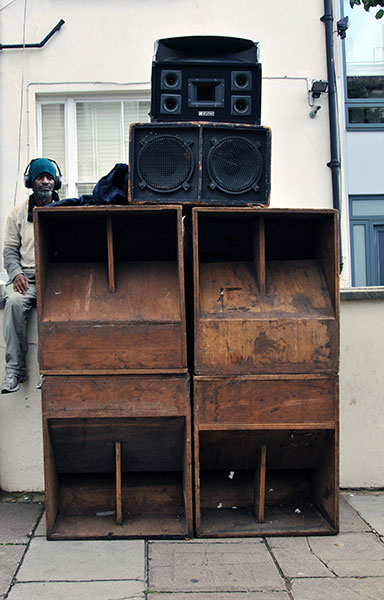Text & Photo: Seb Carayol
For more than 30 years, the family sound system Jah Observer has remained a bastion of roots and culture at the Notting Hill carnival even as the event changed with the gentrification of the city of London. In 2010, the owner, Spiderman, decided to return to Jamaica. The year before I got a chance to follow him and his family throughout the duration of their Notting Hill carnival marathon.
It’s night time and the streets of Ladbroke Grove are empty. The calm before the storm on a friday night, as more than 800,000 people are expected to hit the streets over two days as they have done for decades on the August bank holiday, the last sunday and monday of the month. It’s drizzling. This is where the deal is going down. “He must be parked not too far,” says Austin “Spider” Palmer, the owner and selector of Jah Observer, a historic roots and culture sound system at the Notting Hill carnival. A black BMW flashes its lights twice. A man wearing a leather jacket exits the car while a woman stays inside on the passenger seat. The man flips through a pile of plastic posters and hands one to Austin. It’s the pass that grants a truck access to the area as one of the forty, not one more, official carnival sound systems.
The man with the pass is Ricky Belgrave, DJ for Rapattack and president of BASS, the British Association of Sound Systems, which represents a mobile culture that finds itself ever more constrained. The city of London has been trying to quieten sound systems for the past decade, most notably via noise pollution regulation. The carnival hasn’t been spared even though its success over the past 30 years has largely been due to the presence of sound systems on various street corners. The carnival was launched in 1959 by the Caribbean community as a peaceful answer to racial tensions, notably the murder of a young Antiguan carpenter, Keslo Cochrane. Today, the carnival is best known for its cacophony of musical styles, from soca to techno. Among these, a handful of sounds who still carry the torch of the Jamaican roots of sound systems (Aba Shanti, Channel One, GladdyWax) appear like musical dinosaurs.
Preparing for Carnival (Scroll for More Photos)
On this subject, Spider remembers better times when the soul of Notting Hill hadn’t yet been diluted by property prices. Landing in Croydon, this Jamaican found his vocation as a selector at 12 years old and landed a job in the Rough Trade record shop. He witnessed the carnival becoming a celebration of immigrant music right by the windows of his shop and one day he offered to move the speakers outside, “like everybody did at this time, when there wasn’t a permit for everything,” he laments. “It was spontaneous. You had sound and electricity, you could play day and night, and the carnival was vast. Today, you must be a part of BASS and add yourself to a list in the hope of being one of the 40 selected. And for the past few years, you’re only allowed to play from midday until 7pm.”
To make matters worse, following some trouble, most shops now close during the carnival increasing the cost of attending as a sound. In the past shops would sometimes put money towards the sound system as it might bring them business, but today in order to play for free you must rent trucks and a generator the size of a car. Austin leaves his in the garden of a friend, on the corner of his usual spot on Ledbury Road. In total, the cost is a couple thousand pounds, which must be made back. Some sell records, or find sponsors for their trucks. Jah Observer respects tradition: on the other side of the road, Austin’s wife, Tracey, sets up a food stand full of jerk chicken made just like at home. It’s a leftover from the round robins of his youth, when his parents and their friends rented halls and sounds for dances and sold drinks and food to cover their costs. It’s simple in basis but the logistic becomes complicated when, like the Palmers, you live in Luton, an hour north of London.
A Family Business (Scroll for More Photos)
For them, carnival starts a few days early, even a few weeks for Spider who starts sifting through his records in July, a collection began 40 years ago that occupies an entire room in his house. Jah Observer is first and foremost the life of this family, and their friends. Starting on the friday, Tracey’s mother, who is 74, begins making the fish cakes at home. Then there is GP, Ganja Pilot, a debonair 40-year old with a smoky past who cooks while keeping an eye on her newborn baby. Dawn, who fries faster than you can keep track, a spliff in hand at times, alongside her son. There’s also Spider’s brother, Steve “Flydown”, and his girlfriend, as well as Spider’s son, 19 years old, long dreads, pink backpack and an iPhone constantly in his hand. Also present is the Italian crew Soul Roots, guests who will warm up the crowd. Ten people all in, spread across three rooms all night before spending saturday making return trips to London to go buy chicken, drinks, or bread from “mama”, and transferring speakers and fridges from truck to truck while the Palmer’s garden becomes an improvised assembly-line kitchen. The sun sets, the bees are out, and for now this year’s carnival numbers are five bins of jerk chickens, 14 bread bags, and two trays of cabbage salad.
Following a long day of cooking and logistics is a short night. Spider gets up at 2.30am to be there for 5am, just in case. There are two trucks, one for the sound and one for the food. This year the cops who lock down Notting Hill are easy going. A 7am, the great unpacking can begin. The barbecue is fired and sunday begins with the smell of grilled chicken and a breakfast of cold fish cakes. Spider and the gang are all wearing camo. “When you do carnival, you must be a warrior,” he says laughing. He’s not wrong. He and Tracey will spend sunday night in the truck with the sound while the rest of the team sets up tents on the pavement in front of a travel agent. Exciting for the first timer, a little tiring when you’ve been doing this thirty years and you’re hitting 53 like Austin. “If it was down to me, I would have stopped long ago,” he says mockingly. “But I can’t let down those who come see us cos I’m the only sound to still play with tube amps. Young people ask what they are and the oldies stop and share stories. Observer is historic and friendly.”
Austin doesn’t lie about the authenticity of his sound, the work of a man named Lincoln who built it in 1979. He’s also not lying about the devotion of some of his supporters. Every year at midday on sunday, two friends come and sit on the wall behind “Big Mama”, a 300kg bass stack with four scoops, while others won’t move from the “Observer corner” during both days. The cabling and setup of the seven walls of speakers is finished in time thanks to the rest of the team and Spider begins to smile. “Yes carnival has lost some of its soul a while back but as soon as I start playing, I forget everything.” A slogan is written on a tarp stretched out from the truck where he selects to the walls of speakers: “When our music hits you, you feel no pain.” It’s true. The warmth of Observer’s tube amps makes you forget the arms race that the English scene has become. When the music Spider and his friends select rings out, there is indeed no pain. Here the aim isn’t strength but melody, Jah Observer selects from classic roots by Wailing Souls and Johnny Clarke but also digital killers from Hopeton Lindo, treating the rare and the known with the same deference: his 12″ of Seventh Seal by Sound Iration, ridiculously expensive on eBay, is found without a sleeve amid a stack of other records. It’s how Spider lives life in general, without any vanity or aggression. Clashes? Yes, he’s done some. But one night in 1981, when a sound he invited refused to wait their turn and provoked a fight, was enough to convince him, the only rasta on his team, to go solo. “We aren’t the heaviest or the best,” he smiles. Observer plays good music and is happy about it. As is the crowd, which gets tighter as the weekend goes until you can barely breathe between 4 and 7pm on monday, “the time when you play all the best tunes,” he adds with a wink.
String up the Sound (Scroll for More Photos)
From 45s to dubplates, the bank holiday weekend flew by and the 2009 Notting Hill carnival is over. Weeks of stress for 14 hours of music which had a special taste this year. Not because the carnival, which the city is trying to move to Hyde Park in the hopes of killing it, is turning 50 but because 2009 was perhaps the last one for Jah Observer, the last institution still present every year. Spider and Tracey are just waiting for house prices to rise a little so they can sell their house in Luton and return home, to Jamaica, where they’ve already bought some land. “I’ll be there before my 55th,” he promises. It’s also why he wants to create links with younger sounds interested in his work, such as the Italians of Soul Roots or Chalice, from France. It’s a way of transmitting a style of playing that is getting lost. Spider is wondering. Should he take the whole sound back with him? Leave some in trusted hands? It’s a problem without answer. His brother Steve is motivated but doesn’t have the necessary help for such marathons. His son, under his hood, is more comfortable with his iPhone and doesn’t like to carry anything too heavy. From time to time, he looks absently at the system, which his family spent years putting together, tuning it and transporting it. In the end he asks a question. To the point, and revealing: “Isn’t it boring doing the same thing for 36 years?”

